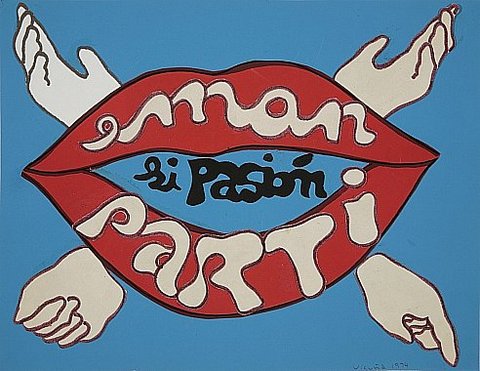University of Essex Collection of Latin American Art,
Nov 18, 2013 - Nov 21, 2013
Colchester, England
Chile 1973-2013: Memory, Accountability and Reparation
by Ximena Moreno
Presidential and parliamentary elections were held in Chile the day before the Latin American Week began. The student leaders who headed the student movement were elected to parliament, while Michelle Bachelet, despite her lead, was unable to win the election on the first round, but won the presidency by a wide margin, in the second round on 15 December. Against this background, Cecilia Vicuña’s work is being highlighted in Chile on the threshold of an important exhibition curated by Paulina Varas and devoted to the collective "Artistas por la Democracia" (Artists for Democracy). Featuring work by John Dugger (author of the Chile Vencerá banner, which was displayed in Trafalgar Square in 1974), Mike Leggett, Liliane Lijn, Cecilia Vicuña and Roberto Matta along with pieces donated by various artists. Organized by the Museo de la Memoria y los Derechos Humanos (Museum of Commemoration and Human Rights) and the Museo Nacional de Bellas Artes (National Fine Arts Museum), Artists for Democracy, el archivo de Cecilia Vicuña will include Quipu de Lamentos a site-specific, sonic-spatial piece created by Vicuña specifically for the Museo de la Memoria.
As the press release for the exhibition states, "The exhibition "Artists for Democracy: the Cecilia Vicuña Archive" is being held today in Chile to restate the demand for participative democracy, its existence or reconfiguration in the face of the ecological, cultural and social crisis that is generating a new mobilization of artists, students and citizens committed to the future of social justice and human co-existence."
In addition, El zen surado (Zensored), a compilation of poems written by Vicuña between 1965 and 1972, has recently been published and is dedicated to the student movement. Although it was the first book she wrote, it is the last to be published after it was censored just prior to publication by UCV publishing house with a print run of 3 000 copies. Zen surado has come to light in a social setting in which social injustices are being condemned once again; apart from being a victim of censorship, it is an inspiring work that supports the aim of social movements. In her dedication for the book, in which a young Cecilia Vicuña appears naked on the cover, she writes: "I dedicate this book to the students who are marching clothed or naked for justice. Poetry and the future depend on them".
Juliet Lynd, who wrote the preface to the book and found the poem Mission in Vicuña’s files, found close links between the 1971poem and the student movement, since the poem presages the kiss-athon that was held, among many other performances by the student movement in 2011.
The poem Misiónz reads:
"Te propongo hacer un viaje/ alrededor del mundo,/acreditados como: Misión investigadora del gobierno socialista./ Tú y yo seremos/ los "besadores"./Besamos mejor que nadie/habiendo desarrollado/ una técnica minuciosa/de cómo besar más perfectamente./No hay mujer que bese como yo/ni hombre que bese como tú. LOS BESADORES besaremos a todas las personas/que encontremos,/para descubrir quién sabe hacerlo mejor/ y aprender por tanto/su técnica,/para practicarla/ y enseguida traerla/a nuestro país socialista,/que será el país de Los Besadores.
Chile’s analysis of its dictatorship/democracy and the distancing of time and generations that have helped it to engage in soul-searching over its recovery of democracy are leading to the abandonment of success-worshipping clichés that are laying bare the old stories that are entwined and paraphrase today’s Chile.
In the words of Juliet Lynd: "The hundred poems (in El zen surado) that are being brought to light capture the multiple dimensions of a poet who is fully confident of the radical transformation of society and a future without sexism, without racism, without inequality and with justice –and pleasure—for all, and hand the reader the tiny seeds and underground writing of Cecilia Vicuña, which has yet to be discovered".
|





